Everywhere you go in Malawi you will find piles of bricks. Stacks of bricks formed into kilns waiting to be baked into completion. Hardened red bricks tossed into piles to be shaped into new buildings.Bricks from destroyed buildings laying in ruins, some perhaps destined to find new life after being reclaimed from their former structures. And dull brown bricks that have just recently been formed.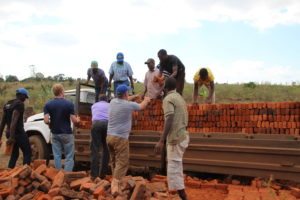 It was the last of the varieties of bricks mentioned that concerned the team on Friday morning. The team was very excited to create bricks, as they saw it as a quintessential Malawian task. Every young man in the village is supposed to build his own house when he comes of age, and because almost none can afford to buy bricks, bricks are constantly being formed in the villages.
It was the last of the varieties of bricks mentioned that concerned the team on Friday morning. The team was very excited to create bricks, as they saw it as a quintessential Malawian task. Every young man in the village is supposed to build his own house when he comes of age, and because almost none can afford to buy bricks, bricks are constantly being formed in the villages.
We met in the village of Khanda, where we would be forming new bricks for use in creating a clinicians house at the Khanda medical clinic. Weekly clinics are held at Khanda now, but if a nice house, with solar power, could be built, a clinician could be attracted to the clinic, which would allow it to remain open throughout the week, treating patients in need. The bricks are created by mixing just the right amount of water with soil and stirring the mud until it resembles a dirty brown porridge. The mud is then slapped into brick molds which are then turned upside down onto the ground, leaving the newly formed brick to bake and harden in the sun. If money and time allow, the bricks are then formed into a kiln and fed with firewood. After 8 hours of baking, the bricks are fully hardened and ready to use.
While this process sounds easy, we quickly found out that it was anything but. Jordan was quickly relieved of her duties as mud stirrer due to lack of progress and I was banned from forming mud in the brick molds after a few unsuccessful attempts. The team was given the, relatively, simple job of emptying the brick molds onto the ground in lines, allowing the wet bricks to dry in the sun. But we soon learned that even this job had its own intricacies. You had to shake the mold from side to side as you pulled up to release the brick. But you couldn’t pull up too fast or the brick would fall out of shape as it hit the ground. You also couldn’t start wiggling the brick mold on the ground, or the brick would lose structural integrity. Our first few attempts were terrible, as the bricks came out squashed and misshapen. But gradually, they became more brick-like and the laughter from the VIP staff and the villagers helping us slowly faded away. By the time the men were done Frank Mwenjemeka told us that roughly 60% of our bricks were good.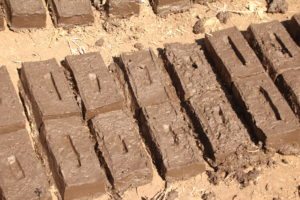
As we were reminded several time throughout the rest of the day, the women on the team did quite a bit better than the men when they took over from us. Which was also a source of great amusement for the villagers and our Malawian staff, as brick making is seen as men’s work. After making bricks the men and women separated from each other. The women gathered together around the fires to prepare lunch for everyone, while the men joined the Chief and Village Head Man (who rules over 5 villages) in the clinic to sit in the shade and speak with one another. This was cause for immediate embarrassment among the American men, and a slower burning anger amongst our female teammates, that was only fully relieved by the nightly briefing back at the farm, when we were all able to talk about the lunch. In Malawian culture, there are some jobs that are considered “men’s work” like building the bricks. But we often saw women doing things that are supposed to be the work of men. However, not one man from the village even thought about going to help the women and we were told by the VIP staff and Liz to sit with the men and to not try to assist. Women in rural Malawi seem, at least from an outsider’s perspective, to have more burdens than men. They must care for the children, gather the water, prepare the meals and often help the men in the fields with farming the land. Perhaps this is why the majority of the villagers who work closely with VIP, and who have put themselves in a position to benefit from VIP initiatives, are women.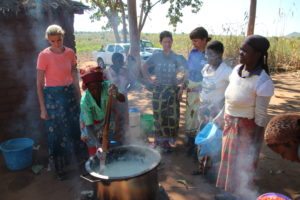
After speaking with the Chief and Village Head Man about the changing weather in Malawi (fewer rains, more drought) explaining how climate change was impacting our lives (I told them about Hurricane Sandy) and attempting to describe basements to everyone “so you live like mice underground?!” the women began to serve us our lunch. I had heard a great deal about Nsima since beginning work at VIP at the start of this year. The national dish of Malawi, nsima is a stiff porridge made from ground maize meal boiled in water. The nsima was served to us in bowls and Vincent Chilombe, VIP Irrigation Engineer, and Frank showed me how to scoop the nsima out of the bowl (with the fingers of my right hand only! In the villages of Malawi the left hand is used for hygiene purposes and it is considered highly offensive to eat with both hands) form it into a ball, and use it to scoop up the “relish” served in bowls on the side. The relish consisted of various roasted meats and a Malawian form of collard greens. I ate the nsima plain., or with a scoop of greens, and it was rather tasteless and was described by my roommate Tom Marrero as “like cream of wheat that had been left to sit out on the counter all day.” But our Malawian hosts certainly enjoyed it, it is said that a Malawian can be served a four course meal and will stay say they haven’t eaten yet, because they hadn’t had any nsima, and they were also very glad to see us eating it.
After thanking the Chief and the Village Head Man for hosting us and after receiving their thanks for VIP’s partnership with them on building the clinician’s house we left the village and separated into two groups. One group visited a Women’s Village Savings and Loan (VSL) group and learned how the member’s lives had been completely transformed by learning how to save and how to pool their resources so that they could make loans to other VSL members. The women had used the money to pay for their children’s school fees, purchase metal sheet roofing to replace their leaky thatched roofs and some had even started a bike taxi business and now had their own employees! It was so unbelievable to hear that poor women villagers who had never worked before were now small business owners because of the VIP VSL training.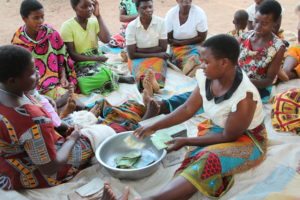
While the other group was at the VSL, Frank took my group to visit a group of farmers (all women) who were practicing small-scale irrigation. Almost all agriculture in Malawi is rain-fed, which is severely limiting, especially in Malawi, which experiences no rain for over half of the year. With the population booming and drought becoming more frequent, it is crucial that Malawian’s begin to embrace irrigation and begin growing crops throughout the entire year. The women were using a treadle pump provided by VIP to pump water uphill from the nearby river to irrigate their fields. It was so exciting to see crops being sown in the midst of the dry season. It is crucial that VIP and farmers throughout Malawi continue to pursue irrigation, as rain fed agriculture will not be able to sustain the population within a few decades. Even now the population is just barely scraping by, and economic progress cannot be made until all Malawians can attain food security.
On Saturday morning the entire team headed to the Sakata School again where we met representatives from many of the villages in the surrounding area who would be helping us work. We would be working on a VIP bridge that crossed a river.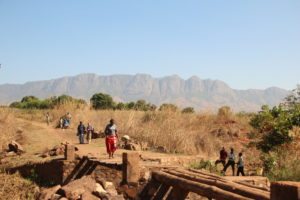 When we got there, the river was barely a stream, but in the heart of the rainy season the river can surge ten feet, making it impassable and preventing children from getting to Sakata School and villagers from accessing the nearby medical clinic. This new bridge will be a crucial artery of communication that will underlie progress across several areas of development. Our first assignment was to use a sledgehammer to crack rocks to use to in making the base of the bridge. Sydney Chikilema picked up the sledgehammer and took a few mighty swings before breaking the sledgehammer on the giant boulders that lay near the river.
When we got there, the river was barely a stream, but in the heart of the rainy season the river can surge ten feet, making it impassable and preventing children from getting to Sakata School and villagers from accessing the nearby medical clinic. This new bridge will be a crucial artery of communication that will underlie progress across several areas of development. Our first assignment was to use a sledgehammer to crack rocks to use to in making the base of the bridge. Sydney Chikilema picked up the sledgehammer and took a few mighty swings before breaking the sledgehammer on the giant boulders that lay near the river. 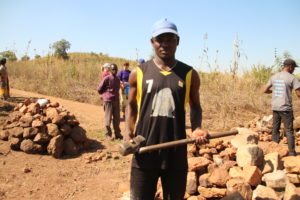
With the sledgehammer out of commission the team moved on to taking river sand and bringing it up in wheelbarrows to use in the mix for the concrete. The place where we were gathering the river sand was less than a hundred yards, as the crow flies, from the bridge. But in order to get there we had to follow a quarter mile path winding up and down hills, through the brush. This made carrying the heavily loaded wheelbarrow full of wet sand back up extremely difficult, backbreaking labor. As Sydney and I made our second trip up the hill with the wheelbarrow, trading off whenever one of us got tired, I heard Jim Garst remarking to Tom “There’s got to be an easier way to do this. We can just design a pulley system and get all this sand up there in a few minutes.” As sweat poured down my forehead and painted wet streaks down the front of my shirts, I couldn’t help but agree with him. But as I thought more about it, I realized that it wasn’t for lack of imagination that we were carrying sand in the hot Malawi mid-day sun. People will always try to make use of their most plentiful resources, and in Malawi that is not tools or metal or wood, but people. It makes more sense to use manpower and brute force labor than to try to buy extremely rare and costly materials to speed up the building process by a few weeks. So from the Malawian’ point of view, our inefficient backbreaking labor was the best strategy. Later, after I had moved from hauling river sand to carrying stones across fields from over a half mile away, I shared my thoughts with Tom, adding that it wasn’t until after the Black Death and the massive drop in population, that Europe really began to embrace the use of tools and machines to make work easier. Before that, it made more sense for Europeans to rely on cheap, plentiful manpower than to invest in costly, uncertain machines. Until we can find a way to improve infrastructure and technological development to the point where tools become worthwhile, Malawians will continue to use the old ways of getting things done.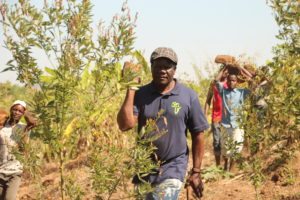
After several hours of carrying heavy sand and large stones several miles we were ready for a break. So we bit into our sugar cane and followed the rest of the men to cut firewood and then lie in the shade beneath the trees while the women prepared lunch. After a minute or two of rest under the tree, the young men that we had been working with asked us if we wanted to go up to the field by the Sakata School to play some soccer with them. As tired as we were it sounded like too much fun to pass up. So Sydney, Isaac Mwalabu, Jim, Tom and I joined the rest of the young men and walked up to the soccer field. After passing around for a few minutes we broke into two teams and started the game. For the next hour we played non-stop soccer with no shade during the hottest part of the day, after working hard all morning, dressed in our work boots and jeans. But I’m so glad we did, it was one of the best experiences I had all trip.
Despite a great goalie on the other team, and staunch defending by Tom, who had played college soccer at TCU, Jim, Isaac and I finished up on the winning side, and I even scored a pair of goals in a 3-2 victory. But as much as I love to win, the most important thing to me about sports is how it brings people together and forms connections that wouldn’t be possible almost anywhere else. While we had been working together on the bridge the Malawians and our team hadn’t interacted as much as we had on other days. The young men in Malawi are often harder to form quick friendships with than children, women and the elderly. But now we were shouting each other’s names as if we were old friends. We hadn’t been able to speak to each other before because of the language barrier, but sports is a universal language. After every goal and great pass, every save or key defensive play we smiled at each other and clapped hands. And when the game was over, players from both teams shook hands and hugged.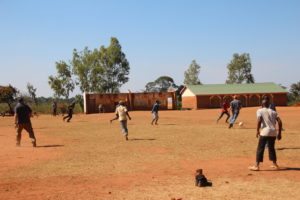
The game had just been a joyous affair and really allowed us to see each other in a whole new light. We weren’t strange azungu, come from thousands of miles away to help the less fortunate Malawians, or whatever thoughts either side might have harbored about the other. We were no longer alien to one another. We were competitors, teammates, friends. As we walked back from the field we talked about the game as best we could, sometimes asking Isaac and Sydney to help us translate. When we got back we washed up, shared our bottles of water and had a lunch of nsima together under a papaya tree. As we dipped our hands into the communal bowls all of the earlier awkwardness had vanished away. We were no longer divided into Americans and Malawians, rich and poor, black and white, we finally were what we always had been: equals.

I participated in a trip to Malawi some years ago
Your story telling is excellent
Brings back memories
Pulitzer Prize worthy!
all i can say is WOW to all they do and just do it. can’t even imagine doing what they do and they are so all right with it. we are so damn spoiled for sure. this is my favorite read every night before turning in. so happy that you are doing this Justin and keep it up. don’t want to miss a thing.
So glad we got to see your competitive side in Malawi, Justin! Your enthusiasm for sportsmanship is truly something haha.
However, my favorite part of the blog was “so you live like mice underground?!”. The answer to that is usually “pretty much”.